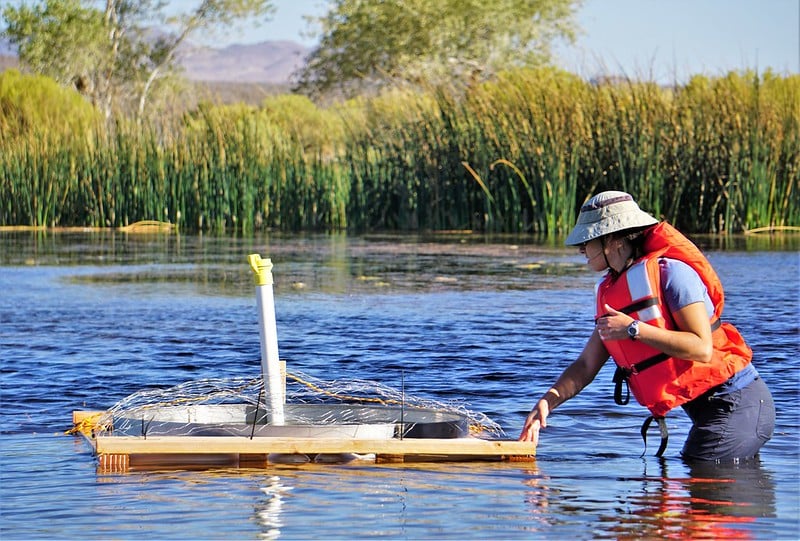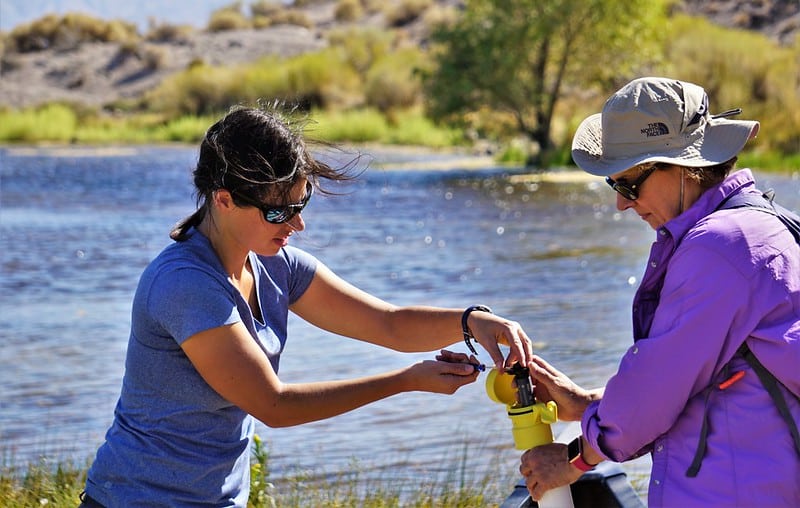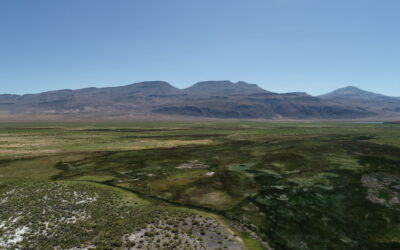Scientists will investigate water quality and flow in critical desert wetland habitat
LAS VEGAS, NEV. (Sept. 30, 2019) —The Desert Research Institute (DRI) is pleased to announce the launch of two new research projects to study hydrology at The Nature Conservancy in Nevada’s 7J Ranch property near Beatty, Nevada. Work will begin in September on two complementary projects, funded by the Sulo and Aileen Maki Endowment, which will install meteorological stations and develop a watershed model to monitor how future restoration activities at the 7J Ranch will affect its water resources.
The 900-acre working ranch in Southern Nevada’s Oasis Valley is a unique place to study water, as it contains the headwaters of the Amargosa River, one of the world’s longest spring-fed river systems that runs mostly below the surface. The ranch’s unique geography and location where the Great Basin and Mojave deserts meet, and its habitat for many endemic and protected species, make it a globally important site for conserving biodiversity and give it strategic value for facilitating climate change adaptation for wildlife. The highly arid environment of southern Nevada and the Amargosa River’s status as an important source of groundwater discharge in the region also make its headwaters an important place to study hydrology.
The first project, led by Kevin Heintz, will install a hydrometeorological station to monitor the habitat at the 7J Ranch and study how surface water is affected by restoration activities and extreme weather conditions. This study is significant to southern Nevada water issues because it will contribute to estimating the flow of water in a critical wetland habitat and it will continuously monitor for environmental stressors, both of which have implications for southern Nevada’s biodiversity and wetland health.
DRI’s second project, led by Gabrielle Boisramé, Ph.D., will study how the potential removal of ponds will impact downstream hydrology and habitat. This project will use a variety of environmental data to develop a water budget model that can describe the movement of water in and out of the restoration area under various scenarios.

DRI researcher Gabrielle Boisrame, Ph.D., inspects a floating evaporation pan at The Nature Conservancy’s 7J Ranch on September 18, 2019. Credit: Ali Swallow/DRI.
“Stream restoration in arid environments like the Mojave Desert has not been studied extensively,” explained Boisramé. “Our hope is that this new research will help guide other restoration work in similar spring-fed streams systems of southern Nevada.”
The Conservancy plans to encourage long-term research at the 7J Ranch, and this project will provide an important base of knowledge for future researchers to build upon.
“This research will provide critical information for needed restoration projects at 7J Ranch, and we are so grateful to the Desert Research Institute for their support,” said John Zablocki, Southern Nevada Conservation Director for The Nature Conservancy. “The insights gained from these projects, and the instruments installed, will help inform better water management decisions for southern Nevada, help predict hydrologic responses to climate change, and help improve modeling on how groundwater flows in the region.”
The Sulo and Aileen Maki Endowment was established by the Sulo and Aileen Maki Trust to be used by the DRI’s Division of Hydrologic Sciences for research, instruction, and scholarships relevant to southern Nevada water issues. The endowment supports innovative, creative, and multidisciplinary research, as well as scholarly endeavors such as journal publications and presentations at scientific conferences, water resources course instruction and student scholarships, and community outreach and service. The overall goal of these efforts is to make the DRI’s Division of Hydrologic Sciences and the name Maki stand for excellence in water resources research, education, and outreach.

Desert Research Institute scientist Gabrielle Boisrame, Ph.D., (left) and graduate research assistant Rose Shillito from the University of Nevada, Las Vegas (right) prepare a pressure sensor for measuring water depth at The Nature Conservancy’s 7J Ranch on September 18, 2019. Credit: Ali Swallow/DRI.
For more information, please contact Sara Cobble, Marketing and Communications Manager for The Nature Conservancy in Nevada, at sara.cobble@tnc.org or Kelsey Fitzgerald, Science Writer for the Desert Research Institute Communications Office at kelsey.fitzgerald@www-dev.dri.edu.
To view a photo gallery of images from 7J Ranch, please visit: https://flic.kr/s/aHsmHaHULv
###
About The Nature Conservancy
The mission of The Nature Conservancy is to conserve the lands and waters on which all life depends. Guided by science, we create innovative, on-the-ground solutions to our world’s toughest challenges so that nature and people can thrive together. Working in 72 countries, we use a collaborative approach that engages local communities, governments, the private sector, and other partners. We’ve been working in Nevada for nearly 35 years. To learn more, please visit www.nature.org/nevada.
About the Desert Research Institute
The Desert Research Institute (DRI) is a recognized world leader in basic and applied interdisciplinary research. Committed to scientific excellence and integrity, DRI faculty, students, and staff have developed scientific knowledge and innovative technologies in research projects around the globe. Since 1959, DRI’s research has advanced scientific knowledge, supported Nevada’s diversifying economy, provided science-based educational opportunities, and informed policymakers, business leaders, and community members. With campuses in Reno and Las Vegas, DRI is one of eight institutions in the Nevada System of Higher Education.
About the Nevada System of Higher Education The Nevada System of Higher Education (NSHE), comprised of two doctoral-granting universities, a state college, four comprehensive community colleges and one environmental research institute, serves the educational and job training needs of Nevada. NSHE provides educational opportunities to more than 100,000 students and is governed by the Board of Regents.


